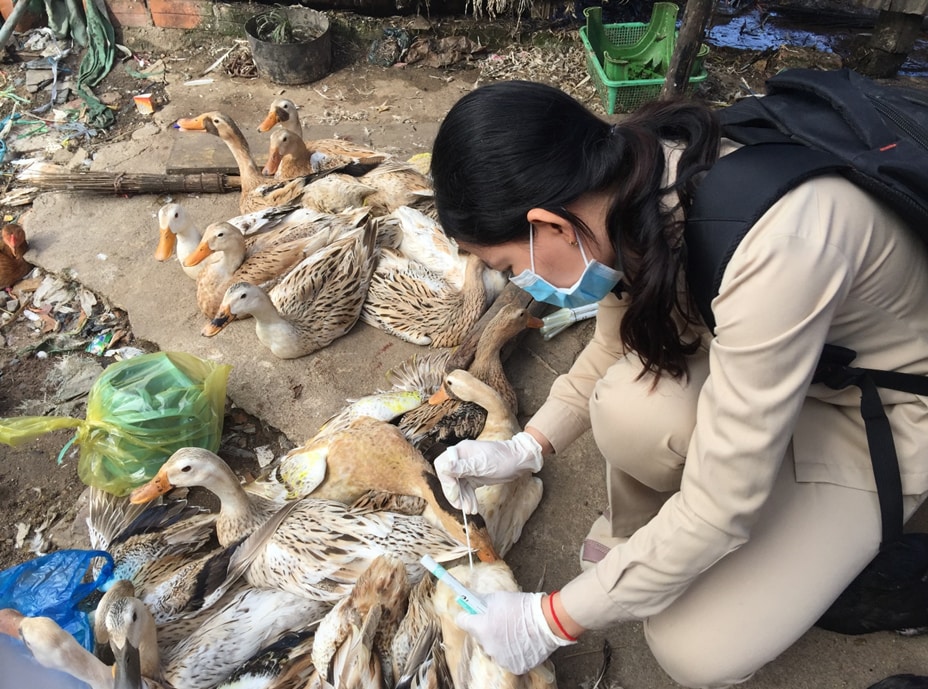What to know
The Cambodian Applied Veterinary Epidemiology Training (CAVET) program aims to strengthen the One Health approach involving human, animal, and environmental health sectors to combat zoonotic diseases such as avian influenza and rabies.

Background
In Cambodia, zoonotic diseases such as avian influenza and rabies underscore the importance of having a multisectoral corps of professionals trained in field epidemiology and outbreak response.
Challenge

Avian influenza was first detected in Cambodia in January 2004. Since then, avian influenza has caused 61 poultry outbreaks. The first human cases of avian influenza occurred in 2005, following interaction with infected birds. This human outbreak resulted in 56 cases and 37 deaths. Avian influenza can cause a large number of deaths among infected domestic poultry and wild birds, and animal health experts are often required to cull flocks of infected birds. These deaths can result in food insecurities and potential economic losses. As shown from 2005 outbreaks, avian influenza can also be fatal to people.
Although data on human rabies deaths are not regularly reported in Cambodia, most rabies deaths in people are caused by bites from suspected rabid dogs. The best approach to control rabies is to ensure that at least 70% of all dogs are vaccinated against rabies. However, mass vaccination campaigns for dogs compete with other health priorities, and dog owners do not always understand the dangers of rabies.
The One Health approach
To address these many challenges, the Cambodian Applied Veterinary Epidemiology Training (CAVET) program was established in 2012. This innovative and collaborative program, funded by the U.S. Centers for Disease Control and Prevention and the Defense Threat Reduction Agency – Biological Threat Reduction Program (DTRA BTRP), is run by the Cambodian Ministry of Agriculture, Forestry and Fisheries (MAFF), Cambodian General Directorate of Animal Health and Production (GDAHP), CDC and DTRA BTRP.
Spotlight
Impact
CAVET Provides Classroom and Field-based Training Experience
Since 2012, 165 participants across seven cohorts have completed the training program. Participants included veterinarians, final-year veterinary students, physicians, human and animal laboratory technicians, and wildlife officers. Most CAVET participants have completed at least an undergraduate degree in Animal Science and Veterinary Medicine.
CAVET combines classroom instruction with field-based practice and research projects.

Classroom instruction allows participants to develop knowledge and skills in epidemiology with an emphasis on measuring disease occurrence, evaluating disease surveillance systems, and conducting outbreak investigation and response activities. Classroom instruction typically includes presentations from national and international human, animal, and environmental health experts.
The field-based training component involves one week of hands-on practice in primary animal diseases occurring in Cambodia (e.g., zoonotic and transboundary animal diseases). Hands on-experience includes animal sample collection, packaging, transportation, and participating in laboratory-based animal necropsy. Following the five-week course, 10 participants from each cohort are selected to develop and complete a six-month research project. Projects focus on priority animal diseases identified in the participants' home city or province. To graduate from CAVET, participants are required to complete the five-week course and the 6-month research project. All CAVET participants are members of the CAVET network and attend alumni meetings and refresher trainings.
CAVET Graduates Focus on Avian Influenza and Rabies
CAVET participants and graduates are actively involved in surveillance and outbreak investigations to prevent and control avian influenza and dog rabies transmission.
In March 2021, animal health experts detected an avian influenza A (H5N1) virus outbreak in free-ranging wild birds. CAVET graduates investigated the outbreak in close collaboration with national and international animal, human, and environmental health agencies. The outbreak involved more than 2,255 wild birds from six different species, including 2,248 Asian Openbill Storks. CAVET graduates used their outbreak investigation training to identify that the likely source of the outbreak was migratory birds. Graduates also applied prevention and control measures, including properly disposing of deceased birds, culling wild birds in infected flocks, and restricting the movement of humans, animals, and animal products in and out of the outbreak area. CAVET graduates collected domestic poultry and wild bird samples for confirming the presence or absence of avian influenza viruses, before declaring a free zone.
Rabies is a fatal but preventable zoonotic disease. Dog slaughterhouses are for-profit businesses where free-roaming dogs are slaughtered and sold as food. In Cambodia, dog bites are a frequent cause of human rabies. CAVET graduates regularly communicate with local authorities and dog slaughterhouse' owners about rabies and the steps to follow to identify dogs with suspected rabies (i.e., suspicious clinical signs of rabies). CAVET graduates also support rabies surveillance efforts by collecting and transporting deceased dogs to the National Animal Health and Production Research Institute (NAHPRI) or Institute Pasteur du Cambodge for rabies virus diagnostics. CAVET graduates also contribute rabies surveillance efforts by collecting and transporting deceased dogs to the National Animal Health and Production Research Institute (NAHPRI) or Institute Pasteur du Cambodge for rabies virus diagnostic testing. CAVET graduates are supporting in an Integrated Bite Case Management (IBCM) project in Phnom Penh, which includes organizing mass dog rabies vaccination campaigns and educating school children and community members on rabies prevention. Education campaigns focus on the vaccination of dogs for rabies and preventative actions to reduce dog bites.
Strengthening the Training Program using a One Health Approach
The CAVET program provides important training for veterinarians and other public health officers on field veterinary epidemiology to prevent and control zoonotic diseases in Cambodia. These diseases, such as avian influenza and rabies, can spill over and spread to the human population.
Gaps in coordination, communication, and collaboration across the animal, human, and the environmental health sectors still exist. To address these gaps in the future, CAVET program managers will increase opportunities to increase participation from the other health sectors, establish a One Health Technical Working Group, and organize One Health events such as the National Epidemiology Conference, and promote multisectoral engagement in zoonotic disease surveillance and outbreak response activities.

